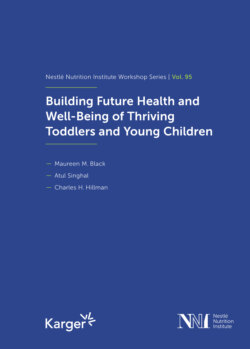Building Future Health and Well-Being of Thriving Toddlers and Young Children

Реклама. ООО «ЛитРес», ИНН: 7719571260.
Оглавление
Группа авторов. Building Future Health and Well-Being of Thriving Toddlers and Young Children
Nestlé Nutrition Institute Workshop Series
Building Future Health and Well-Being of Thriving Toddlers and Young Children
Contents
Preface
Foreword
Contributors
Toddler Development and Autonomy: Baby-Led Weaning, Neophobia, and Responsive Parenting
Abstract
Introduction
Toddler Development
Growth, Motor Skills, and Physical Activity
Learning
Language
Sleep
Attachment and Separation Anxiety
Autonomy and Independence
Toddler Eating Behavior
Baby-Led Weaning
Food Neophobia
Responsive Feeding
Conflict of Interest Statement
References
Global Landscape of Nutrient Inadequacies in Toddlers and Young Children
Abstract
Introduction
Monitoring Young Child Growth and Weight
Micronutrient Deficiencies – The Big 4
Dietary Diversity, Feeding Frequency, and Minimum Acceptable Diet Scores
Dietary Intake Surveys
Conclusions
Conflict of Interest Statement
References
Nutrition Related-Practices in Brazilian Preschoolers: Identifying Challenges and Addressing Barriers
Abstract
Introduction
A Historical Pathway throughout Nutrition in Brazil
Current Challenges regarding the Feeding of Brazilian Toddlers
Opportunities to Enhance Toddlers’ Feeding. Family Level
School Setting
Obesogenic Environment
Conflict of Interest Statement
References
Growth Faltering: Underweight and Stunting
Abstract
Introduction
Global Distribution of Stunting, Wasting, and Underweight in Toddlers and Young Preschoolers
Timing of the Development of Stunting and Wasting
Can Toddlers and Young Preschoolers Recover from Stunting and Wasting?
Nutrient Needs of Toddlers and Young Preschoolers
Do Toddlers and Young Preschoolers Require Special Diets?
Nutrition-Sensitive Actions and Interventions to Improve the Growth and Development of Toddlers and Young Preschoolers
Conflict of Interest Statement
References
Obesity in Toddlers and Young Children: Causes and Consequences
Abstract
Introduction
Environmental Risk Factors for Obesity
Genetic Risk Factors
Nutritional Risk Factors
Sugar and Sugar-Sweetened Beverages
Portion Size
Physical Activity, Sedentary Behavior, and Sleep
Developmental Factors
Consequences of Childhood Obesity
Overview
Conflict of Interest Statement
References
Summary on Challenges in Nutrition in Toddlers and Young Children
Transition from Breastfeeding and Complementary Feeding to Toddler Nutrition in Child Care Settings
Abstract
Importance of the Infant to Toddler Transition
Role of Child Care in Infant and Toddler Nutrition
Development of Child Care Nutrition Standards for Infants and Toddlers
Implications for Research and Practice
Conflict of Interest Statement
References
Selected Micronutrient Needs of Children 1–3 Years of Age
Abstract
Introduction
Methods to Assess Micronutrient Requirements
Specific Nutrients. Iron
Zinc
Calcium
Vitamin D
Magnesium
Dietary Sources of Key Minerals and Fortification Strategies
Future Research Needs
Acknowledgment
Conflict of Interest Statement
References
You Are What Your Parents Eat: Parental Influences on Early Flavor Preference Development
Abstract
Introduction
Perinatal Sensory Experiences and the Role of the Mother
Environmental Factors That Limit Newborns’ Exposure to Flavors of Healthful Foods
Parents’ Role in Complementary Feeding
Parents’ Role in Providing Sensory Exposures during Complementary Feeding
Parents’ Role in Socially Facilitating Flavor Preferences during Complementary Feeding
Environmental Limitations That Reduce Infants’ and Toddlers’ Access to Healthful Foods
Final Thoughts
Conflict of Interest Statement
References
Introducing Hard-to-Like Foods to Infants and Toddlers: Mothers’ Perspectives and Children’s Experiences about Learning to Accept Novel Foods
Abstract
Introduction
Emergence of Children’s Food Preferences
Developmental Influences on Children’s Food Acceptance
Caregiver Influences on Children’s Emerging Self-Regulation
Neophobia Emergence and Challenges
How Do Caregivers Make Decisions Related to Feeding Persistence?
Caregiver Feeding Priorities and the Influence on Maternal Persistence in Offering Difficult-to-Like Foods
Conclusions
Acknowledgments
Conflict of Interest Statement
References
Dietary Sugars: Not as Sour as They Are Made Out to Be
Abstract
Historical Background
Axioms
Arguments from an Evolutionary Perspective
Arguments from the Perspective of Metabolism in Childhood
Arguments from the Perspective of Estimating Adult Chronic Disease Risks
Conclusion
Conflict of Interest Statement
References
Summary on Advancing from Infancy to Toddlerhood through Food
A Review of the Effects of Physical Activity on Cognition and Brain Health across Children and Adolescence
Abstract
Introduction
Preschool Children
School Age Children. Preadolescent Children
Adolescent Children
Future Directions
Conclusion
Conflict of Interest Statement
Funding Sources
References
Nutrition Effects on Childhood Executive Control
Abstract
Introduction
Lutein
Choline
Water
Dietary Fibers
Conclusion
Conflict of Interest Statement
References
The Importance of Motor Skills for Development
Abstract
Motor Skill Acquisition Is Behavioral Development
Motor Skills Reveal “Typical” Development
New Motor Skills Instigate Cascades of Development
The Development of Motor Skills Makes Behavior Functional and Flexible
Conclusions
Conflict of Interest Statement
References
The Importance of Providing Opportunities for Health Behaviors during the School Day
Abstract
Introduction
Key Findings among the Research
Physical Activity in All Schools
School Nutrition and Healthy Eating
Discussion
Whole School, Whole Community, Whole Child
Student Access to Healthy Foods and Beverages at School
Self-Determination Theory
Implications
Conflict of Interest Statement
References
Summary on Health Behaviors and the Developing Brain
Subject Index
Отрывок из книги
Building Future Health and Well-Being
of Thriving Toddlers and Young Children
.....
Dr. Justine E. Hoch
Department of Psychology
.....